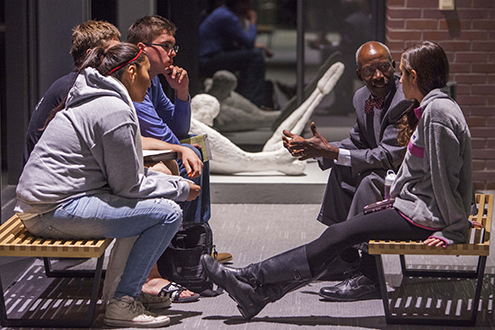
Five Questions: Kazi Joshua
Kazi Joshua, associate dean and director of the Center for Intercultural Advancement and Student Success (CIASS), answers our questions. Since 2009, he has been a part of many initiatives to promote diversity and civic engagement at Allegheny. He teaches courses in the FS program, Values Ethics and Social Action (V.E.S.A) and Black Studies. His academic interests are in the interdisciplinary study of contemporary social movements for change and their potential for creating a just society.
- What is your favorite spot on campus?
The Gator Quad because it is in the center of campus, and you can never miss anyone. It combines the beauty of the outdoors, with an inside feeling. It is really the village green that speaks to Allegheny’s sense of community.
- What in your opinion makes Allegheny a unique place?
It is the kindness and generosity of the people here. Often people remark how different the college is from others, and it always boils down to the fact that people really care and they are genuinely nice without fakeness.
- What is the coolest thing that Allegheny has made possible for you?
I teach a number of courses across the disciplines having to do with service, civic engagement, social change and social justice. These are not easy topics to deal with. They both challenge the students and bring out the best of what Allegheny students are. Outside class, students have been committed to creating the kind of community that can embrace a great deal of diversity. They are thoughtful in navigating challenging conversations, and seeking to be the kind of persons who would inhabit the sort of community they hope Allegheny to become.
- What goal(s) have you set for the next three years?
I would like to make Allegheny more diverse and more consistent with our values. It is clear that we have to go beyond the usual places for our recruitment. We have to reach beyond the usual schools and areas. A change in our curricular offerings that also includes study in diverse areas, as currently proposed by the curriculum committee, is another way. Of course the presence of faculty, staff and administrators that mirror the diversity of the student body is absolutely invaluable. If we do all these things and we act decisively when actions inconsistent with the values of inclusion and community occur, we will be well on our way.
- You are seated next to President Mullen at dinner. What do you strike up a conversation about?
Diversifying the highest levels of administrative leadership at Allegheny. We know that when you have a diverse group of leaders, you have a more thoughtful outcome of complex issues and policies. President Clinton spoke of his cabinet as “looking like America.” That should be our aspiration and our practice.